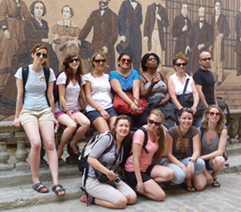Discovering Cuba
- Submitted by: admin
- Travel and Tourism
- United States
- 06 / 15 / 2010

The students immerse themselves in Cuban culture for two weeks, but the experience often changes them forever.
“They reflect on life here and how we take for granted so many of the choices and options we have here,” says Donna Rogers, chair of the Department of Spanish and Latin American Studies and academic coordinator of Dal’s Cuba intensive exchange program.
“A lot of them talk about feeling pushed to extend their horizons and step out of what’s comfortable … they say they will go back to their daily lives, changed.”
The exchange, a joint effort by Dal and FLACSO (Latin American Faculty of Social Sciences) at the University of Havana, accepts approximately 15 students each spring.
They attend lectures, which are translated into English, each morning at the University of Havana on subjects ranging from economics, education, and political history to social development, health, and changes since the Revolution.
They also visit relevant sites, including a Primary school, a maternity hospital, the National Ballet, the Museum of the Revolution, art galleries, an organic urban farm, and the free Latin American Medical School (ELAM).
Marian MacKinnon, administrator of Dal’s International Development Studies program, helped found the exchange 13 years ago and has been the coordinator ever since, which means she’s made 33 trips there. (She also manages a semester exchange program for students from across Canada.)
This year she received a special recognition award from FLACSO, which thanked her for “many years devoted to raising working links and solidarity between Cuba and Canada” and for her tireless efforts to further the exchange program.
Along with managing all of the logistics, MacKinnon makes sure there are gifts and donations, whether it’s crayons, backpacks and skipping ropes for schoolchildren or soap, shampoo and body lotion for pregnant women.
A few years ago, she even managed to take 12 bicycles to donate to Cubans.
She often takes eye drops to treat glaucoma and on this latest trip was able to supply her Cuban colleagues with much-needed coffee.
“It’s unbelievable how the Cubans manage. They deserve a lot of credit, because we could never do it,” she says.
The program, she says, was established to provide Dal students with hands-on experience as they learn about the complexities of a developing society.
Students from sophomore year on are eligible, but must foot their own bill. To date, 269 have participated (and another 286 in the semester program).
“They live and breathe Cuba, and see how the Cubans really live, which is much different than being on a resort beach,” says Ms. MacKinnon.
Students do an interview assignment, and write an in-depth research paper upon their return. They also keep a journal.
“The journal is a reflection on development issues, on their own assumptions and interactions and perceptions and experiences,” says Dr. Rogers.
These are interesting times for the exchange, she notes.
“There have been changes, and we all sense that many more changes are coming … so the chance to see Cuba, to participate at this particular historical moment is something the students are going to look back on for a very long time,” she says.
By Skana Gee
Source: dalnews.dal.ca/
Comments